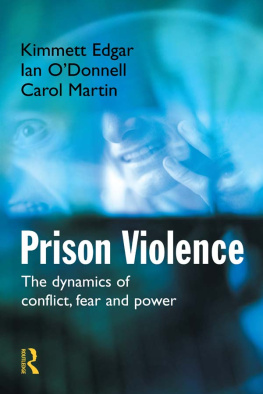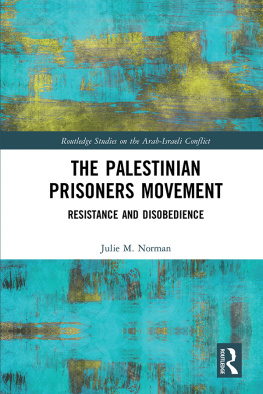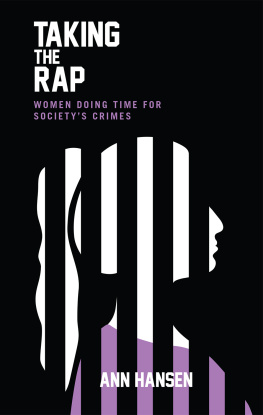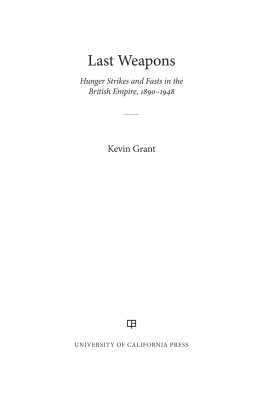Out of Order
Out of Order
The political imprisonment of women in
Northern Ireland, 197298
Mary S. Corcoran
Published by
Willan Publishing
Culmcott House
Mill Street, Uffculme
Cullompton, Devon
EX15 3AT, UK
Tel: +44(0)1884 840337
Fax: +44(0)1884 840251
e-mail:
website: www.willanpublishing.co.uk
Published simultaneously in the USA and Canada by
Willan Publishing
c/o ISBS, 920 NE 58th Ave, Suite 300,
Portland, Oregon 97213-3786, USA
Tel: +001(0)503 287 3093
Fax: +001(0)503 280 8832
e-mail:
website: www.isbs.com
Mary S. Corcoran 2006
All rights reserved; no part of this publication may be reproduced, stored in a retrieval system, or transmitted in any form or by any means, electronic, mechanical, photocopying, recording or otherwise without the prior written permission of the Publishers or a licence permitting copying in the UK issued by the Copyright Licensing Agency Ltd, 90 Tottenham Court Road, London W1P 9HE.
First published 2006
Paperback
ISBN-13: 979-1-84392-162-2
ISBN-10: 1-84392-162-6
Hardback
ISBN-13: 979-1-84392-163-9
ISBN-10: 1-84392-163-4
British Library Cataloguing-in-Publication Data
A catalogue record for this book is available from the British Library
Project managed by Deer Park Productions, Tavistock, Devon
Typeset by GCS, Leighton Buzzard, Beds.
Printed and bound by T.J. International Ltd, Trecerus Industrial Estate, Padstow, Cornwall
List of figures and tables
Figures
Table
Dedicated to my parents: Mary Corcoran and the
memory of Martin Patrick M.P. Corcoran
List of organizations
| ALJ | Association for Legal Justice |
| CAJ | Committee on the Administration of Justice |
| ICC | Irish Council of Churches |
| ICJP | Irish Commission for Justice and Peace |
| IIP | Irish Information Partnership |
| INLA | Irish National Liberation Army |
| NCCL | National Council for Civil Liberties |
| NIACRO | Northern Ireland Association for the Care and Resettlement of Offenders |
| NICRA | Northern Ireland Civil Rights Association |
| NIO | Northern Ireland Office |
| NIPS | Northern Ireland Prison Service |
| OIRA | Official Irish Republican Army |
| PIRA | Provisional Irish Republican Army |
| POA | Prison Officers Association |
| RUC | Royal Ulster Constabulary |
| SACHRE | Standing Advisory Commission on Human Rights |
| SF | Sinn Fin |
| UDA | Ulster Defence Association |
| UFF | Ulster Freedom Fighters |
| UVF | Ulster Volunteer Force |
Acknowledgements
This book could not have been completed without the generosity of others. My thanks to Liverpool John Moores University, for the teaching assistantship that helped me to do my PhD. Thanks to my former colleagues Nickianne Moody, Nicole Matthews and Jonathan Purkis. To Joe Sim for leaving a stain upon the silence. I am also indebted to the following: Tim Ashplant, Mike Tomlinson, Bernie Hayes, Paddy Hillyard, Anne Worrall, Jo Phoenix, Yvonne Murphy and Kieran Crossey at the Linenhall Library, Belfast, Lin Quilty, and D.A. Tidy for her resigned good humour throughout this project.
I am indebted to the organizations which support prisoners and their families: Coiste na n-archimi, the Ex-Prisoners Interpretative Centre, the Prisoner's Aid and Post-conflict Resettlement Group, the staff at the Prison Visitors Centre at Maghaberry, Sinn Fin Prisoner of War Department, the Northern Ireland Association for the Care and Resettlement of Offenders and Tar Anall.
Many participants must remain unnamed. I extend my appreciation to the staff who co-operated with this research, to the Prison Officers Association, the Northern Ireland Prison Service, the prison chaplains, members of the religious and voluntary organizations who support prisoners and their families, the Northern Ireland Association of Members of the Board of Governors.
I am also abidingly grateful to the former prisoners who gave me so much of their time and insights. It is hoped that this effort is an adequate witness to their experiences.
Keele University, October 2005
Introduction
Although one in twenty prisoners detained during the Troubles in Northern Ireland was a woman, the nature of the regimes in which they were confined has been barely addressed in the academic literature. Despite the centrality of events in the prisons to the momentum of disorder and violence at different junctures of the conflict, most accounts have focused on the experiences of men prisoners. With few exceptions, the analysis of political imprisonment in Northern Ireland has rarely impinged on the other systematic influences that sustained it, notably the gendered organization of punishment in prison. As a consequence, the roles and experiences of women political prisoners in Armagh, and later Maghaberry, prisons have been cast as being of incidental or separate significance to the general development of political imprisonment in Northern Ireland.
This absence of women as political actors in the prisons has directly and indirectly shaped the concerns of this book. Directly, in that it addresses the historical deficit in accounting for women's role in the campaign of resistance by prisoners in Northern Ireland from the internment of women in 1972 to the release of the last female prisoner under the terms of the Belfast Agreement in November 1998. Indirectly, in that women's political imprisonment was a site of converging relationships between political, penal and gendered ideologies and controls, which took the question of their resistance beyond being solely a matter of contesting the State's right to punish.
Situating women in the Northern Ireland prison campaign
Therefore, there are three separate dimensions to my task: accounting for women as political prisoners; accounting for political prisoners as women in prison; and accounting for the gendered and political dimensions of prison punishment. The first task addresses the problem whereby women were subsumed under prevailing definitions of political imprisonment. The conventional analysis of political imprisonment centres on the development of specialized areas of criminal law, jurisprudence or prison administration for dealing with politically related crime. The central questions that arise from a wide variety of intellectual sources relate to the problems of reconciling the actuality of political detention with constitutional norms, or the pursuit by governments of legitimate courses of action in the face of illegal or self-authorized claims to political- or prisoner-of-war status by individuals and groups. At the same time, as Carol Smart (1992) reminds us, the law is a master discourse, concerned with establishing authoritative rulings and operating within a universalizing explanatory framework. It does not provide us with a socially differentiated explanation of the implications and practices of political detention. As this book outlines, this has significant and often negative implications for the treatment of detained women.








